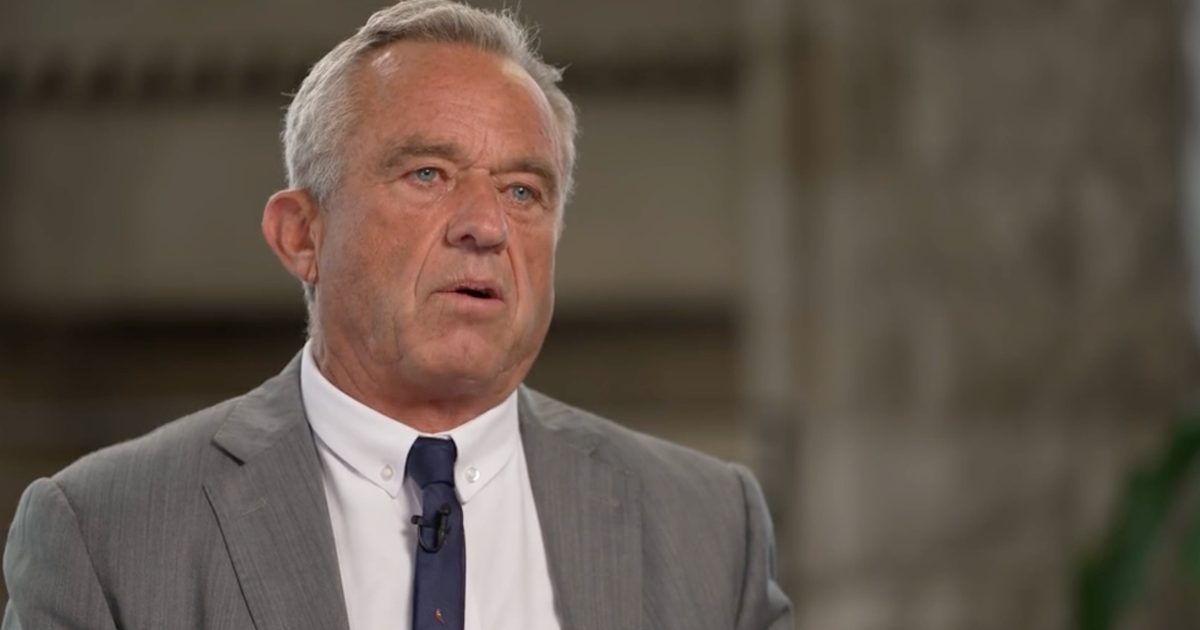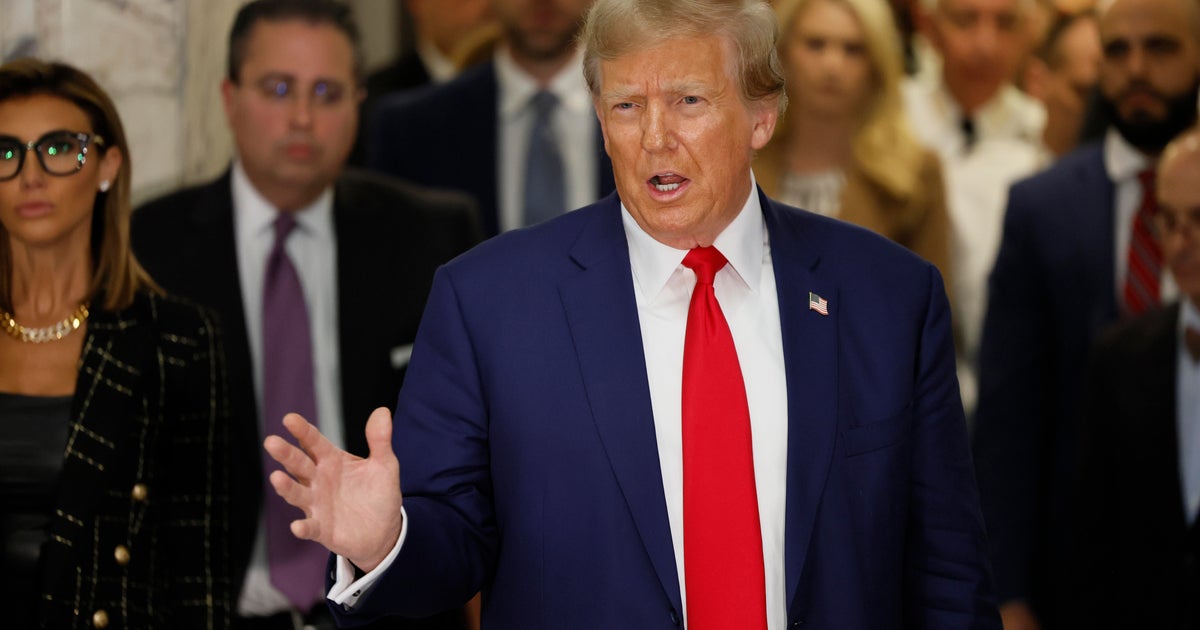Ex-IRS contractor Charles Littlejohn, who admitted leaking Trump's tax records, sentenced to 5 years in prison
Washington — The Internal Revenue Service contractor who pleaded guilty to leaking the federal tax records of former President Donald Trump and some of the nation's wealthiest individuals was sentenced Monday to 5 years in prison, 3 years supervised release and a $5,000 fine. The sentence brings an end to a criminal case that exposed the source of a number of high-profile tax information leaks in recent years.
Charles Littlejohn, 38, pleaded guilty to one count of unauthorized disclosure of tax returns and return information in October and faced a maximum sentence of 5 years in prison. Investigators said he used his position as a contractor with the nation's tax collector to illegally obtain and then disperse the financial records of the former president, which resulted in "numerous articles" based on the information.
Before sentencing Littlejohn on Monday to the maximum penalty, federal District Judge Ana Reyes called his conduct "an attack on our constitutional democracy."
"He targeted the sitting president of the United States of America, and that is exceptional by any measure," Judge Reyes said. "It cannot be open season on our elected officials."
Littlejohn made a brief statement before the court, acknowledging that "I alone am responsible for this crime." He said he was driven by a desire for transparency, but was also aware of the potential consequences of his actions.
"I made my decision with full knowledge that I would likely end up in a courtroom to answer for my serious crime," he said. "I used my skills to systematically violate the privacy of thousands of people."
Littlejohn's explanations did not appear to sway the court's sentencing decision. Reyes said courts must be an "unbreakable bulwark" for American democracy in the face of increased threats.
The court's job, the judge said, was to make sure that others never viewed "this type of conduct as acceptable or justifiable or worth the trade-off…We are a nation of laws."
In a filing ahead of Monday's hearing, prosecutors said that over a two-year time period, Littlejohn "abused his position" and "weaponized his access to unmasked taxpayer data to further his own personal, political agenda, believing that he was above the law."
Government attorneys urged the judge to impose the statutory maximum prison sentence against him, saying in court Monday that "he sought to influence an election and reshape the nation's political discourse" in one of the "most serious" crimes in IRS history.
"Today's sentence sends a strong message that those who violate laws intended to protect sensitive tax information will face significant punishment," Nicole Argentieri, acting head of the Justice Department's criminal division, said in a statement in response to the yearslong prison sentence.
Charging records did not name Trump as the high-ranking government official alleged by investigators to have been victimized by Littlejohn's conduct, but a person familiar with the matter confirmed to CBS News at the time that it was the former president. One of Trump's attorneys attended a plea hearing last year to read an impact statement on the former president's behalf.
Prosecutors wrote in their sentencing memo this month that Littlejohn — who had previously worked at the IRS contracting company — returned to a position working with the IRS "with the hope and expectation" of gaining access to Trump's tax records. They alleged he "exploited a loophole" in the computing system to upload the stolen data to a private website and then stored the information on a personal device before leaking Trump's tax returns to an unnamed news organization six months later.
A person familiar with the investigation confirmed to CBS News that Littlejohn had leaked Trump's tax information to the New York Times, which declined to comment when Littlejohn was charged. The Times reported that in 2016, when Trump won the presidency, he paid just $750 in federal income taxes, and he paid $750 again in 2021, his first year in the presidency.
When the Times published its extensive reporting on Trump's tax returns in September 2020, then-editor Dean Baquet wrote in an editor's note, "Some will raise questions about publishing the president's personal tax information. But the Supreme Court has repeatedly ruled that the First Amendment allows the press to publish newsworthy information that was legally obtained by reporters even when those in power fight to keep it hidden. That powerful principle of the First Amendment applies here."
The Justice Department's court filing revealed that the other tax returns Littlejohn admitted to acquiring dated as far back as 15 years, and they belonged to thousands of the nation's wealthiest Americans. Investigators alleged he mailed a storage device containing the information to another unnamed news organization, identified by CBS News as ProPublica.
At the time that Littlejohn was charged, the publication declined to comment and said it "doesn't know the identity of the source who provided this trove of information on the taxes paid by the wealthiest Americans."
The information contained in the data, according to prosecutors, went beyond tax returns and included sensitive information like stock trades, gambling winnings, and audit determinations. His goal, they wrote, was to "catch the attention of the public with more salacious details than mere tax returns might provide," noting that the alleged harm he caused continues as press reports from the leaked data continue to emerge.
"He executed his disclosure scheme over the course of multiple years, plotting and calculating carefully at each step to minimize the risk of detection and maximize the impact of his disclosures," the Justice Department wrote. "Indeed, he reorganized his entire life around this crime."
Florida Senator Rick Scott sent a letter to Attorney General Merrick Garland last week revealing that the Florida Republican had been a victim of Littljohn's admitted scheme. He criticized the plea deal on the single charge and delivered a statement in court, calling Littlejohn's agreement with the Justice Department as the "plea deal of the century."
"Every American is a victim here," Scott said, explaining his family would be affected by the leak for years to come. He argued the plea agreement was representative of a politicized process. Judge Reyes notably interrupted the senator's statement in court after warning that political statements would not be permitted.
"The fact that he did what he did and he is facing one felony count, I have no words for," the judge said, with exasperation in her voice.
The judge appeared frustrated at times with prosecutors as she wrestled with guidelines recommending a sentencing range of just 18 months and a crime that she said warranted serious punishment and deterrence. Reyes asked prosecutor Jonathan Jacobson for information on any additional charges Littlejohn may have faced if he had opted not to enter the guilty plea, but the government attorney did not provide further detail and said the charge Littlejohn faced was the most appropriate based on the crime that was committed.
Prosecutors argued Monday the sentence of 60 months that they sought would be adequate punishment and a deterrent for others who might seek to repeat his actions.
"They need to see, and they understand, your honor, that the consequences will be serious," prosecutors said.
Littlejohn's defense attorney urged Judge Reyes in a recent court filing to reject the maximum sentence of 5 years that the Justice Department sought, writing a months-long period of incarceration fit the crime.
"He committed this offense out of a deep, moral belief that the American people had a right to know the information and sharing it was the only way to effect change," the defense team argued. "He did what he thought was right at the time, but now fully acknowledges that he was wrong."
Replete with supportive comments and testaments to his character from family and friends — including personal details and journal entries focused on his interests in tax burdens — Littlejohn's court filing asked for leniency and noted his past education, work accomplishments as an IRS contractor, and lack of criminal history.
According to court documents that worked to justify his actions as motivated by a desire for financial equality, Littlejohn initially struggled with his decision to release the records he accessed but ultimately opted to do so.
"He understood that the New York Times would take similar precautions to its prior reporting on the subject — securely maintain the data, would not publish the records themselves, and would use the information solely for journalistic purposes," the defense wrote.
"He greatly regrets the theft of these records and having disclosed them to the media," the defense wrote of Trump's tax data.
On Monday, defense attorney Lisa Manning continued to press for a shorter sentence and said prosecutors have asked the court to "throw away the law" in far exceeding the sentencing guidelines. He had accepted responsibility and spoke with investigators about the extent of his crimes, she argued.
Judge Reyes ordered Littlejohn to turn himself in by April 30.



